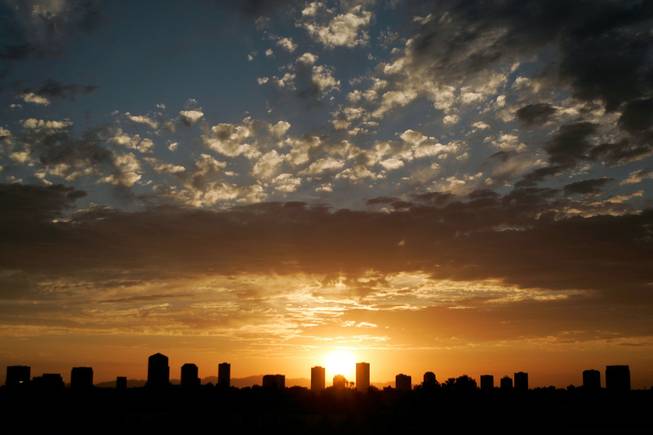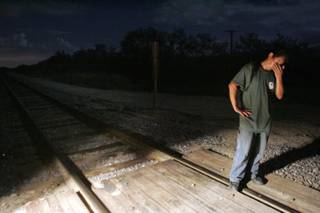
The sun sets above uptown Phoenix. While Sen. John McCain will likely win his home state in the November elections, the changes sweeping through the electorate in Arizona are mirrored in other Intermountain West states, including Nevada, that are crucial to both candidates.
Sunday, Aug. 17, 2008 | 2 a.m.
Hispanics rise in Phoenix
Like its namesake the mythical bird, which rose to life anew from its ashes, some might argue the city of Phoenix is also being reborn -- with a growing Hispanic population that is emerging from the political fire of strong immigration enforcement. Find more coverage here.
Sun Expanded Coverage
Beyond the Sun
Beatriz Escalante, a hotel sales manager, paints a grim picture of life in Hispanic communities here, hunkered down and racked with fear.
Sheriff Joe Arpaio, the long-serving lawman of Phoenix’s Maricopa County, has instituted aggressive tactics aimed at sweeping up illegal immigrants. Arpaio’s teams round up large groups of Hispanics suspected of being in the country illegally. The sweeps inevitably also net legal residents, who are released once it’s determined they belong here.
The action is popular with many cultural conservatives in a state with a strong tradition of Republicanism. As for many Hispanics: “He’s scaring the population,” Escalante said.
But in 2008, Arpaio’s aggressive pursuit of those policies could have devastating consequences for the future of the Republican Party here, as more and more Hispanics become eligible to vote and turn on the party, angered by men like Arpaio.
Arizona is not an isolated case. The entire intermountain West faces demographic changes consistent with what’s happening in Arizona.
Hispanics aren’t the only newcomers. People of all races are moving here from the Midwest, as they have done for decades. The newer trend has many younger Midwesterners migrating, as well as Californians of all ages moving east to the state.
What do these newcomers need and want from their government?
Ask Jim Kolbe, a former Republican congressman who represented Tucson for 20 years, what the new Arizonans seek, what key issues the intermountain West must confront in the coming years, and he says managing growth, preserving water, creating energy and transforming transportation.
He doesn’t mention federal lands or grazing fees or taxes or guns or other Western issues of days gone by.
Kolbe’s conclusion: “The Rocky Mountain states are undergoing a tremendous transformation the Republican Party has not recognized. If it’s going to maintain its dominance, it’s going to have to change to changing circumstances.”
Before the South went fully Republican in the party’s 1994 landslide, the intermountain West was the party’s foundation. Unless voters wanted to mine or graze on federal lands, they wanted to be left alone. They despised taxes, gun control and zoning laws that limited their property rights, which they saw as absolute.
But the region has quickly urbanized, with some of the highest per capita rates of urban living in the country. Western populations are hoarded into vast, sprawling “megatropolises,” as Arizona development expert Grady Gammage Jr. calls them: Las Vegas, Phoenix, Albuquerque, Salt Lake City and Denver.
The new urban dwellers want more from government: They want good schools and cops, of course, but also mass transit, higher density urban living and the protection of open spaces. Phoenix, for instance, opens its new light-rail line soon, linking downtown to Tempe.
Add it all together – demographic change, transplanted Midwesterners and Californians, and urbanization, and the region’s politics could be entering desert monsoon season.
The Democratic Party has thrown many of its cage-free, organic eggs in this Western basket, granting Nevada an early caucus this past year, which brought loads of excitement to the states’ voters. The party then chose Denver for its convention this month.
Republicans who voted in their party’s state primaries made a smart choice in Sen. John McCain. His selection assured their candidate would carry an important state, one that otherwise would be in play in the presidential race against the coming Democratic nominee, Illinois Sen. Barack Obama.
But New Mexico, Colorado and Nevada and their rapidly changing electorate remain very much undecided in the presidential race. This year, those three may well determine the outcome.
In McCain, the party chose their only viable candidate to support legislation that would have given many illegal immigrants the chance at citizenship, which has endeared him to many Hispanics. McCain will still lose Hispanics badly, but not as badly as his closest competitors for the Republican nomination would have.
If McCain becomes president and passes comprehensive immigration reform, he can be a hero to Hispanics and save his party from losing them forever. If not, the Republicans will likely walk away from the issue, at which time Hispanic voters may walk away from them for decades even as their numbers grow swiftly.
Escalante, the hotel sales manager, said Arpaio has instilled fear in the populace. “Nobody shops. No grocery store. No pharmacy. No mall. They’re so scared, they don’t go out.”
Indeed, one deserted commercial area of heavily Hispanic Mesa, a fast-growing community outside Phoenix, looks more like Rust Belt malaise than Sun Belt prosperity.
Arizona also passed a law imposing stiff sanctions on employers who knowingly hire illegal immigrants. On the second offense, the business can lose its license to operate in Arizona.
Some anecdotal evidence suggests the tactics are working, according to William Dixon, a University of Arizona political scientist. Despite an economy suffering many of the same ills as Nevada’s – primarily, the housing bust – Arizona employers report trouble finding workers.
Undocumented workers are packing up and leaving for other states, and in some cases, returning to their home countries. Families here legally often have relatives who aren’t, and they leave together.
To many here, Arpaio is a hero. (Arpaio’s office said it would inform the Sun about a planned action to round up illegal immigrants but never did so, and didn’t respond to later interview requests.)
Arpaio’s defenders, including Gene Cafarelli of the Minutemen Civil Defense Corps, say it’s immoral to encourage families to make the dangerous trek across the desert by not controlling the border. Cafarelli correctly noted the immigrants are often at the mercy of the rapacious “coyotes” who bring them across, only to arrive in America and be exploited again by unscrupulous employers.
Arpaio’s sweeps, as well as the state law sanctioning employers, have polarized the debate here in Arizona.
Harry Garewal, who heads up the Arizona Hispanic Chamber of Commerce, said the sheriff’s tactics amount to racial profiling and said Arpaio and his Republican allies in the Legislature are damaging the state’s image.
What should worry Arizona Republicans – and does worry many – is the image of the party among Hispanics. Although some immigrants are leaving, the state’s demographic reality is unquestionable.
As in Nevada, the growth of the Hispanic population here is outpacing the white population. Of Arizona’s 6.5 million people, nearly 30 percent are Hispanic, up from 25 percent in the 2000 Census.
During the 1990s, the Hispanic population grew 88 percent.
The non-Hispanic white population is now below 60 percent of the total. The U.S. Census Bureau said last week that the United States will be a minority-majority country – meaning whites will be in the minority – by 2042.
In Arizona, it will be much sooner.
This demographic data presents extreme danger for Arizona Republicans. Hard-liners who question Mexican-American loyalty to the United States or accuse immigrants of leeching off American social services threaten to drive Hispanics into the arms of the Democratic Party.
This trend combines with another troubling one for Arizona Republicans. According to University of Arizona demographer David Plane, America is moving east. Not back to Buffalo or Cleveland, but from California to Arizona, Nevada and other intermountain West states.
Matt Callahan, Dave Soms and Geoff Cox all moved here from the Midwest, for good weather, for opportunity, for family, for the excitement of something new. They represent another trend: Younger people moving to Arizona from Midwestern states, and bringing more liberal values with them.
Callahan, who gathered last week as he does occasionally with Soms, Geoff Cox and other transplanted Midwesterners at Sunset Bowl in Phoenix, moved here from Michigan seven years ago. He said he would pay more taxes for better schools and roads and more money for police. (But McCain can sigh a breath of relief if Callahan is representative of voters like him: Callahan’s voting McCain, not because he likes him, but because he doesn’t think Obama is ready.)
Margaret O’Mara, a historian of the American West at the University of Washington, argues that Arizona today is similar to California in the ’90s. Republicans there pushed a voter initiative viewed by Hispanics as pure punitive demagoguery.
The result: “California was a swing state, and now it’s a Democratic state,” O’Mara said.
Dixon of the University of Arizona agreed, saying the recent immigration battle could be a boon to Democrats: “We’re seeing younger people, young Hispanics, getting involved in politics more than they used to.”
Garewal had a glint in his eye when he talked about mobilizing Hispanics. He said California in the 1990s is an apt analogy and talked about the coming day when large numbers of Hispanic young people will be old enough to vote.
The effects are already evident. Barry Goldwater, the giant of conservative politics and his party’s 1964 presidential nominee, represented Arizona in the U.S. Senate for decades, and the congressional delegation was long dominated by Republicans. The delegation is now split, with Democrats picking up two seats in 2006, with a third likely this year because of the indictment of Republican Rep. Rick Renzi.
Democratic Gov. Janet Napolitano overwhelmingly won reelection in 2006, peeling off moderate Republicans in droves.
Kolbe, the retired Republican congressman, was blunt: “We need to reach out to these populations and meet their needs, or we will disappear.” It was also advice salient for Nevada Republicans.
Arizona Republican state Rep. Mark Anderson, who is running for Congress against first-term Rep. Harry Mitchell, said Republicans must do better at communicating their core values of low taxes, limited government and school choice to Hispanics. He said that agenda transcends race.
But Anderson may be delusional. His fellow Republican Kolbe said the West has changed, and voters are looking for more. They want pragmatic solutions to problems such as energy, traffic and the other effects of rapid growth.
Moreover, political scientists have shown that emotion drives voters as much as issues.
When Goldwater ran against the 1964 Civil Rights Act during his failed presidential campaign that year, and when Republicans successfully used racial appeals as an electoral strategy for decades after that, black voters left the Republican Party, never to return.
Escalante described her community’s fears, but then offered a promise, which sounded like a threat: “The little kids all wanna grow up to be politicians.”
Sun videographer Matt Toplikar and photographer Leila Navidi contributed to this report.



Join the Discussion:
Check this out for a full explanation of our conversion to the LiveFyre commenting system and instructions on how to sign up for an account.
Full comments policy